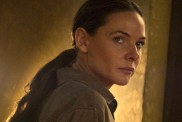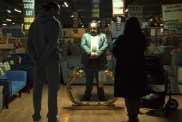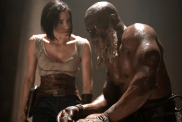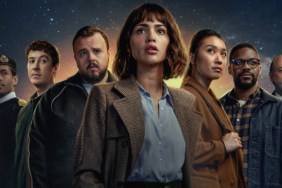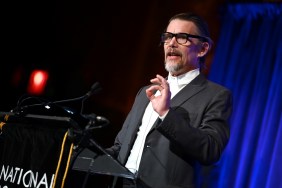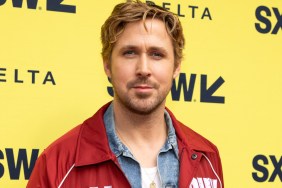
Writer and director Charlie McDowell explains why The Discovery is a film you’ll want to see more than once
The Discovery, the sophomore feature from The One I Love‘s Charlie McDowell, is now available to stream on Netflix. Directed by McDowell and scripted by he and Justin Lader, The Discovery is the latest example of the streaming service’s commitment to bringing what would traditionally be big-screen fare to audiences across the world. Chatting with CS, McDowell discussed his stylish blend of enormous science fiction ideas filtered through a indie aesthetic and backed by an all-star cast that includes Robert Redford, Rooney Mara, Jason Segel, Riley Keough and Jesse Plemons.
RELATED: Netflix Debuts The Discovery Trailer with Rooney Mara, Jason Segel and Robert Redford
The Discovery takes place in a world where the afterlife has just been scientifically proven and examines the actions of regular people in the wake of such an astonishing revelation. If you check out the film this weekend, be sure to let us know your thoughts in the comments below!
CS: I have really enjoyed your films so far and, in both cases, had the pleasure of going in without any knowledge of what the film was about. There’s almost an “Amazing Stories” quality in seeing them side by side. Where did “The Discovery” begin?
Charlie McDowell: Thank you! I actually, funnily enough, started just after we wrapped “The One I Love.” I was driving back to Ojai, California with Justin Lader, my writing partner, who in the car told me that he had a new idea for a movie. At first I was like, “Oh, man. Can’t we just take a break?” We had literally just wrapped “The One I Love.” He said, “Well, I just have a basic question. That’s, ‘What if the afterlife was scientifically proven? How would we as humans react?” Science and religion would have to come together. How does someone react to that news? The idea of suicide came up. Not in the way that actual suicidal people might kill themselves, but more, “What if death doesn’t mean what death means?” What if you are constantly living, but in a new place each time? Is death then even considered death anymore? What if, in your life, you sort of despise your job or you can’t pay your mortgage. These simplistic things that effect every human. We wanted to explore the idea of, “What if you could go somewhere else? Would you want to?” We had that universal idea or question and, from there, it was just about building characters within that world. Ultimately, we’re making a film about these characters and it really is a love story. The backdrop to those characters, though, is about asking what would happen if the afterlife was proven.
CS: It seems like one of the fun parts in having an idea like this is that the conversations you’re having about the discovery are probably very similar to what your characters are asking themselves.
Charlie McDowell: Yeah, that was our sort of rule. There’s a scene in the beginning between Jason Segel and Rooney Mara’s characters where they’re sort of discussing their stance on the discovery and what’s happening in the world of this story. It didn’t have to be exposition, because we’re exploring it through these characters and how these characters feel about the world. It’s kind of a great place to be where you’re doing these kind of grounded sci-fi stories. You can explore these big themes, but we’re doing it all through these characters and their personalities. Instead of relying on a big-budget idea where you’re doing special effects and things like that. Our rule was ultimately that, if it works through the characters, we explore it. If it doesn’t we leave it alone.

CS: One of the real charms of both “The Discovery” and “The One I Love” is that they’re both really, really big movies on a mental level, but they’re framed through an indie aesthetic. It’s obviously working for you quite well, but I am curious to know if a giant blockbuster scale film is something you’d also like to try.
Charlie McDowell: Not in the case of these two. I feel like we really got to explore both of these stories in the way we wanted to explore them. I think that, with more money, the message and themes and the ideas would have been muddled. Do I ever want to tell a story with $100 million? Yeah, I would, but it has to be the right one. There are stories that can only be told with larger amounts of money. But I’m very happy that I got to explore these two movies the way I wanted to.
CS: How did Robert Redford end up becoming involved?
Charlie McDowell: The fact that Robert Redford is in the cast still blows my mind. He’s someone that I grew up idolizing. He’s an icon for his work as an actor, but also as a human being. I just respect him in so many ways. I had never really thought about him for the role, because he’s untouchable to me. There was no version where I ever thought he would be in my tiny little indie movie. Then Brian DePersia, who’s an agent at WME, sent me a list of people who were available. He called me and said, “What about Redford?” I said, “He would be unbelievable, but there’s no way he would ever do this.” Then, in discussion with his agents, I learned that he’s so untouchable in people’s minds that not everyone goes to him. They just assume he’ll never do it. I was either stupid enough or smart enough to go him. He read the script and liked it. He was going to be in LA in a specific date and asked if he could meet me. We sat down and discussed the character and the story and the movie I wanted to make. Right there, he said he wanted to do it. It was a surreal experience, but he’s such a genuine, sweet human being who doesn’t make you feel like he’s bigger than you in any way. It felt like someone I could really collaborate with and not just an actor I could look up to and idolize. I let go of that really early on not because I didn’t feel it, but because it was a safe space where I could collaborate and he wanted me to work with him.
CS: Not that it’s similar aesthetically, but I was thinking about how if this plot were a film 50 years ago, you might have had someone like Vincent Prince in that role.
Charlie McDowell: That’s funny, yeah. It’s an interesting character. The opening scene is the first scene that we wrote. It’s really sort of setting where we are and the state of the world. That was the first thing we wrote to figure out what we wanted to do. In casting that character, we kept looking at that scene. We needed someone who, if they tell you that there’s scientific proof of an afterlife, you have to believe them in our story. There are very few people who, if you say that, you believe them. Redford is definitely one of those people. In that opening scene, he’s explaining how the afterlife is proven and you believe him. He’s a larger-than-life person in the same way as a modern day Einstein or Steve Jobs. I really needed that for the character to work. He just brings that with his persona.
CS: How detailed do you need to think out the science fiction side of things?
Charlie McDowell: I always keep it very grounded. There’s always the question of, “What if this happened to me?” That’s the place I liked to play. If it felt futuristic in any way, I’ve gone off course. For me, the point of making these grounded genre films is to ultimately make people think. To bring who they are into the DNA of the film and lead to it in that way. That was always a through line for me. I wanted this piece to be something to really think about and, hopefully, by the end, you’ve really connected with your heart and it’s not just about thinking. But it is a think piece for sure. “The One I Love” was similar and there you also make the connection of, “What would I do in this situation?”

CS: Do you know what’s next for you?
Charlie McDowell: As long as I’m saying something. I don’t have to play in the sandbox of this grounded sci-fi. I do like, because I think it says something and can be played with visually as well as having something to say. To me, the only purpose in making films in my mind is to talk about something and go to a place that might be difficult, but that can make you still think and question. I still go see films for entertainment and I love them, but for me as a filmmaker, I really want to have a purpose in telling a story. You spend so many years making these stories and putting them together, so you better really love them. The next thing for Justin Lader, my writing partner and myself, is a Don DeLilo book, “Zero K.” Noah Hawley came to us with it and it’s something we really love. We’re adapting that with Scott Rudin producing for FX. It will be a limited series. It’s an esoteric sci-fi that definitely explores things similar to what we’ve explored before, but in a bigger, more visual way.
CS: That’s very cool. It seems like you and Noah Hawley make for an interesting pair.
Charlie McDowell: To me, it’s sort a dream come true, because I’m obsessed with his stuff and the stories he’s telling. He’s also such a brilliant mind. To be able to collaborate with someone like that? We haven’t done that before. We’ve only really collaborated between ourselves. Collaborating with someone we like and respect so much has led to such an incredible collaboration so far.
CS: I did want to ask about Netflix and the fact that “The Discovery” is debuting via the service. What does that offer you as a filmmaker?
Charlie McDowell: We make these stories for people to see and to hopefully be moved by. Netflix reaches out to the world. They are so few places that can do that. People in different countries and cultures will see my movie and have their own opinions about it. To me, that’s amazing. I am someone who goes and sees movies in theaters, but I also watch Netflix. I enjoy the balance and I hope we maintain that balance. I’m not someone who thinks that we should only watch movies in theaters or at home or on our phones. But I do believe that the model should exist because it’s a new frontier. This year is a big year for their movies. They have a bunch of really interesting films that are coming out this year. I’m really excited to be a part of it. Then the other thing is that the hope for this film is that you watch it more than once. The first time you see it, it’s something else and with Netflix there’s no better way to watch it again, whether that’s right after or a week later.
The Discovery
-
The Discovery

-
The Discovery

-
The Discovery

-
The Discovery

-
The Discovery

